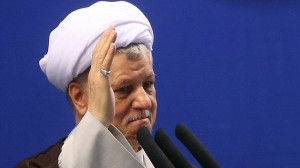 In the last minutes of the nominations for the presidency, Ayatollah Hashemi Rafsanjani officially threw his hat in the ring while his supporters had gathered anxiously around the Ministry of Interior building. Rafsanjani had recently announced that he would not participate in the elections without Iran’s Supreme Leader Ayatollah Khamenei’s agreement.
In the last minutes of the nominations for the presidency, Ayatollah Hashemi Rafsanjani officially threw his hat in the ring while his supporters had gathered anxiously around the Ministry of Interior building. Rafsanjani had recently announced that he would not participate in the elections without Iran’s Supreme Leader Ayatollah Khamenei’s agreement.
Although Rafsanjani had previously indicated that he is not committed to an unquestioning commitment to Khamenei, this time, this possibility is unlikely, because Rafsanjani has full awareness of his own lack of a power base and his retreat before his former political ally Khamenei. Also, considering that his publicly ignoring the leader of Iran’s wishes seems insignificant to him, it is likely that raising the issue of Khamenei’s agreement with this decision was merely a crafty pretense which was intended to neutralize his rival and prevent him from taking advantage of legal and illegal levers to oppose Rafsanjani. In any case, Rafsanjani’s decision will no doubt have an impact on the course of events in the Iranian elections; but what role will Rafsanjani play in the twists and turns of Iranian power?
First, he will create an atmosphere of election excitement, and this time — contrary to initial prognostications but indeed just as in previous terms — Iran will see heated and energetic elections, particularly since all the Reformists, a significant fraction of the traditional conservatives, the Qom Sources of Emulation, the middle layers of the seminaries and even the majority of the foreign opposition will give him united support.
Second, the cold atmosphere of despair over Iran will be broken around the world, including in the region, the international communities’ moral pressure and even the increasing material pressure on Iran will be decreased, particularly in the matter of the nuclear issue and intense pressure from the West and countries in the region, and we will see an improvement of conditions for Iran.
To the West, Rafsanjani represents a broad team of liberal technocrats who want civil freedoms domestically and a policy of relieving tensions abroad, prioritizing economic progress, contrary to the Islamic Republic’s ideological goals; especially since he has lately focused on issues of abstaining from adventurism and has particularly been recalled as easing tensions with Israel. Moreover, the Arab countries of the region, particularly Saudi Arabia, have had a good experience with him in confidence-building with the Arab world, and some of the Arab leaders, such as Jordanian King Abdullah, have a relationship of relative personal friendship with him.
Third, the damage suffered by the leader of Iran’s image as a result of the events surrounding last term’s elections and his absolute support of Iranian President Mahmoud Ahmadinejad will be repaired and recover. Moreover, the leader of the revolution will show in theory that he has a democratic mentality and that his support for each government is because it was elected and there will be an open political atmosphere based on Iran’s law and political custom.
Fourth, the scattered and divided atmosphere of the presidential candidates will become organized and new organizations shall arise out of the coalitions of candidates and parties, particularly since before this, most of the former coalitions were broken up and each of their members has declared his separate candidacy. As a result, the upcoming president will enjoy powerful social support from within Iran’s power structure, which on the whole should be considered in the interests of the system’s political structure.
From these points, it seems that three principle coalitions will gather in the coming days: the Reformists, with all their factions, along with the traditional conservatives, the conservative classes and the middle layers of the Qom seminaries, in support of Rafsanjani; the Fundamentalist Conservatives, including the Endurance Front connected with Ayatollah Mesbah Yazdi, the Revolutionary Guards and the people around the leader of Iran who are against Rafsanjani; and Ahmadinejad’s supporters in support of Ahmadinejad's Chief of Staff Rahim Mashaie, should his candidacy be accepted, who submitted his candidacy along with Rafsanjani at the last minute. The only possibility for a fourth coalition exists if it receives the direct support of the leader (although the probability of this is insignificant for this term), which will be formed around Velayati, Qalibaf or Jalili.
According to the above scenario, and the unlikelihood of Khamenei supporting a specific candidate, Rafsanjani has the strongest chances of winning the upcoming elections, particularly since the idea of opposing Rafsanjani to attract people’s votes has passed its expiration date and indeed, on the contrary, it is now Rafsanjani’s enemies who are in the position of being accused of economic and political corruption. Moreover, the great variety in the election and the convoluted character of the political transactions in this round of voting compared to the bitter experiences of the past has reduced the likelihood of the elections being engineered or the votes being tampered with. This aside, Rafsanjani’s chance of complete success in the upcoming term of the presidency to overcome the domestic and foreign difficulties are not great, just like in his previous terms, and depend on how the leader and other power bases in Iran cooperate.
By Al-Monitor
The Iran Project is not responsible for the content of quoted articles.

 QR code
QR code